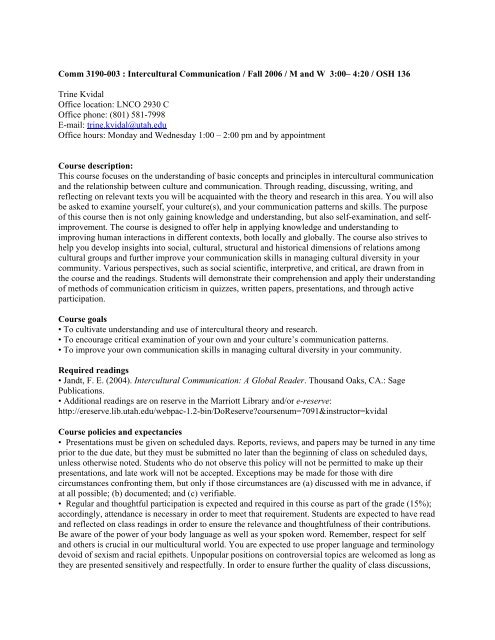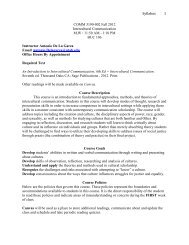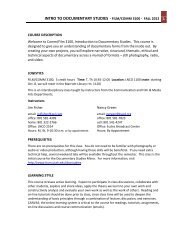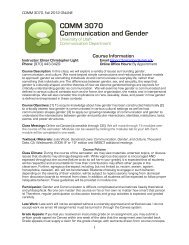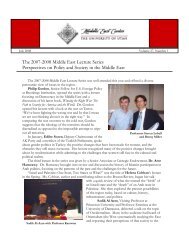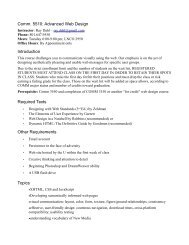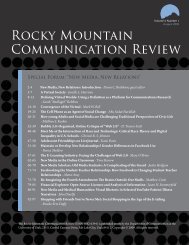Comm 3190-003 : Intercultural Communication / F 05 / M W 3:00 – 4 ...
Comm 3190-003 : Intercultural Communication / F 05 / M W 3:00 – 4 ...
Comm 3190-003 : Intercultural Communication / F 05 / M W 3:00 – 4 ...
Create successful ePaper yourself
Turn your PDF publications into a flip-book with our unique Google optimized e-Paper software.
<strong>Comm</strong> <strong>3190</strong>-<strong><strong>00</strong>3</strong> : <strong>Intercultural</strong> <strong>Comm</strong>unication / Fall 2<strong>00</strong>6 / M and W 3:<strong>00</strong><strong>–</strong> 4:20 / OSH 136<br />
Trine Kvidal<br />
Office location: LNCO 2930 C<br />
Office phone: (801) 581-7998<br />
E-mail: trine.kvidal@utah.edu<br />
Office hours: Monday and Wednesday 1:<strong>00</strong> <strong>–</strong> 2:<strong>00</strong> pm and by appointment<br />
Course description:<br />
This course focuses on the understanding of basic concepts and principles in intercultural communication<br />
and the relationship between culture and communication. Through reading, discussing, writing, and<br />
reflecting on relevant texts you will be acquainted with the theory and research in this area. You will also<br />
be asked to examine yourself, your culture(s), and your communication patterns and skills. The purpose<br />
of this course then is not only gaining knowledge and understanding, but also self-examination, and selfimprovement.<br />
The course is designed to offer help in applying knowledge and understanding to<br />
improving human interactions in different contexts, both locally and globally. The course also strives to<br />
help you develop insights into social, cultural, structural and historical dimensions of relations among<br />
cultural groups and further improve your communication skills in managing cultural diversity in your<br />
community. Various perspectives, such as social scientific, interpretive, and critical, are drawn from in<br />
the course and the readings. Students will demonstrate their comprehension and apply their understanding<br />
of methods of communication criticism in quizzes, written papers, presentations, and through active<br />
participation.<br />
Course goals<br />
• To cultivate understanding and use of intercultural theory and research.<br />
• To encourage critical examination of your own and your culture’s communication patterns.<br />
• To improve your own communication skills in managing cultural diversity in your community.<br />
Required readings<br />
• Jandt, F. E. (2<strong>00</strong>4). <strong>Intercultural</strong> <strong>Comm</strong>unication: A Global Reader. Thousand Oaks, CA.: Sage<br />
Publications.<br />
• Additional readings are on reserve in the Marriott Library and/or e-reserve:<br />
http://ereserve.lib.utah.edu/webpac-1.2-bin/DoReserve?coursenum=7091&instructor=kvidal<br />
Course policies and expectancies<br />
• Presentations must be given on scheduled days. Reports, reviews, and papers may be turned in any time<br />
prior to the due date, but they must be submitted no later than the beginning of class on scheduled days,<br />
unless otherwise noted. Students who do not observe this policy will not be permitted to make up their<br />
presentations, and late work will not be accepted. Exceptions may be made for those with dire<br />
circumstances confronting them, but only if those circumstances are (a) discussed with me in advance, if<br />
at all possible; (b) documented; and (c) verifiable.<br />
• Regular and thoughtful participation is expected and required in this course as part of the grade (15%);<br />
accordingly, attendance is necessary in order to meet that requirement. Students are expected to have read<br />
and reflected on class readings in order to ensure the relevance and thoughtfulness of their contributions.<br />
Be aware of the power of your body language as well as your spoken word. Remember, respect for self<br />
and others is crucial in our multicultural world. You are expected to use proper language and terminology<br />
devoid of sexism and racial epithets. Unpopular positions on controversial topics are welcomed as long as<br />
they are presented sensitively and respectfully. In order to ensure further the quality of class discussions,
2<br />
please be in class on time and remain in class for the entire period; interruptions can be distracting. See<br />
the following link for more information: http://www.acs.utah.edu/sched/handbook/attend.htm<br />
• Make sure your e-mail address is current in your student record in order to receive all e-mails I send to<br />
the class roll. Check the status of your e-mail at www.utah.edu (from Student menu select Registration<br />
and Records, then update your Student Profile if your e-mail address is not correct or one that you usually<br />
check).<br />
• The University of Utah seeks to provide equal access to its programs, services and activities for people<br />
with disabilities. If you will need accommodations in the class, reasonable prior notice needs to be given<br />
to the Center for Disability Services, 162 Olpin Union Building, 581-5020 (V/TDD). CDS will work with<br />
you and the instructor to make arrangements for accommodations. All written information in this course<br />
can be made available in alternative format with prior notification to the Center for Disability Services.<br />
See the following link for more information: http://www.sa.utah.edu/ds/<br />
• The registrar cautions students that withdrawing from a course and other registration matters are the<br />
student’s responsibility. The last day to withdraw without tuition penalty is September 1. See the<br />
following link for more information: http://www.sa.utah.edu/regist/pages/Deadlines.html<br />
• In accordance with university policy (as articulated in the Student Code), academic misconduct—<br />
including cheating, fabrication of information, and plagiarism—is not tolerated in this course. A student<br />
found engaging in this behavior will receive a failing grade. If at any time you are unsure whether your<br />
actions constitute academic misconduct, please see the instructor in order to clarify the matter. See the<br />
following link for more information: http://www.admin.utah.edu/ppmanual/8/8-10.html<br />
• Readings and materials assigned for this class have been carefully selected. As we study intercultural<br />
communication, we will apply the concepts we engage to a variety of examples, including those that<br />
occur in the venue of popular culture. Some students may find some of the materials, presentations,<br />
lectures, or audio/visual materials controversial or in conflict with their core values. Please be assured that<br />
all the material that I present, assign, or require you to encounter and address has been selected for its<br />
overall value and its operationalization of concepts we are engaging. I will not make content<br />
accommodations for this material. It is your responsibility to review the syllabus, readings, assignments,<br />
and materials to be sure that this is a course you wish to take. Should you have questions or concerns,<br />
please see me immediately. Details on the university’s accommodation policy are available at this link:<br />
http://www.admin.utah.edu/facdev/accommodations-policy.pdf<br />
Course requirements and grade distribution<br />
Participation and attendance: 15 points<br />
Cultural collage: 5 points<br />
Quizzes: 15 points<br />
Reading report and presentation 15 points (10+5)<br />
Group project and presentation: 25 points (20+5)<br />
Final paper and presentation: 25 points (24+1)<br />
Total: 1<strong>00</strong> points<br />
Grading scale<br />
A 1<strong>00</strong>-94 A- 93-90<br />
B+ 89-87 B 86-84 B- 83-80<br />
C+ 79-77 C 76-74 C- 73-70<br />
D+ 69-67 D 66-64 D- 63-60<br />
F 59 and below
3<br />
Quizzes (15 points)<br />
The class is discussion based and in order to intelligently contribute to the discussions you will need to be<br />
familiar with the material. Occasionally, there will be random quizzes to check your reading habits. I will<br />
not announce quizzes beforehand, so please come prepared. Quizzes will usually be given at the<br />
beginning of class. If you are late to class or absent you will not be given the opportunity to make up a<br />
quiz.<br />
Cultural collage (5 points)<br />
Create a collage to visually tell the class about yourselves in terms of your culture (cultural values and<br />
experiences, practices, observations, etc.). Reflect on yourself and your cultural background and be<br />
creative, you will be sharing who you are with the class. Pay attention to how your peers share their<br />
cultural stories and be open to engage in constructive dialogue. This self-reflexive work gives you a<br />
chance to introduce yourselves to others through your culture as well as understand other’s culture at the<br />
level that they share their personal history with you.<br />
Individual reading report and individual presentation (10+5 points)<br />
You will be assigned to present one of the articles in our reading list to the rest of the class. This<br />
assignment emphasizes understanding of intercultural theory and research.<br />
Write a 1-2 page report, summarizing the article’s key points and main arguments. Include at least 3<br />
discussion questions directly related to the article or relevant to issues raised by the article. Based on the<br />
report and the discussion question you should deliver a 10-minute presentation. The report is to be<br />
submitted for evaluation after the presentation (see writing requirements on p. 5). Presentation format and<br />
guidelines will be discussed further in class (see presentation guidelines on p. 6).<br />
Group project and group presentation (20+5 points)<br />
This assignment aims to help you understand the way intercultural communication plays out in real life.<br />
At the beginning of the semester you will be assigned to a project group and you will develop a team<br />
agreement with your group in class. You are responsible for acting in accordance with your group’s team<br />
agreement. Each group must conduct a case study of a specific cultural group by engaging in an<br />
intercultural activity. You are free to design the project yourselves and use whatever resources your group<br />
members have. For instance, you can conduct library research about a minority group, interview people<br />
within the group and compare what you learn from the books with what you find out from the interview.<br />
You can also attend cultural events different than the ones you usually attend (such as fair, religious<br />
service, community gathering, political rally, sport event, etc.) to experience being outsiders or<br />
newcomers and then compare and contrast this experience with one that you are familiar with. You can<br />
also draw on different group member’s cultural background to compare and contrast each member’s<br />
experience of the same cultural event. To avoid having several groups focusing on the same cultural<br />
event, all groups must run their topic by the instructor. I will go by a first-come-first-pick policy here; if<br />
your project is similar to another group’s event/topic, you will have to find another event/topic for your<br />
project.<br />
Write a 5-7 page paper based on the case study, detailing the process, the findings and conclusions of<br />
your study. You are free to choose among social scientific, interpretive, and critical approaches. Your<br />
written argument(s) should draw from your group’s cultural field experience (use specific examples) and<br />
must be supported through library research. Use at least three library sources. In addition, you may use as<br />
many of the readings from class as you want. The group must give a 15-20-minute presentation to the<br />
class based on their findings. The paper must be submitted for evaluation after the presentation (see<br />
writing requirements on p. 5). Presentation format and guidelines will be discussed further in class (see<br />
presentation guidelines on p. 6).
Final paper and presentation (24+1 points)<br />
This assignment aims to help you use intercultural theory and research to examine and understand<br />
intercultural communication. Choose one paper option (A, B, or C). Use at least two library sources as<br />
part of your paper. In addition, you may use as many of the readings from class as you want. You must<br />
also prepare a 5-7-minute presentation to be given during the last weeks of the semester. Presentation<br />
format and guidelines will be discussed further in class (see presentation guidelines on p. 6).<br />
Option A:<br />
Write a 5-6 page paper after you have participated in and attended two events coordinated, presented,<br />
sponsored by, organized by, and performed by members of a culture other than your own. You must have<br />
the events approved by me before you attend them. You may not use previous intercultural experiences<br />
for this assignment (like the one(s) related to your group project). Examples of these cultural events<br />
include cultural fairs, volunteer experiences, church socials, weddings, performances, etc. You can locate<br />
events by looking in the school and local newspapers, contacting student and local organizations, and<br />
through friends, family, or classmates. Your objectives in attending these events are 1) to learn as much as<br />
possible about the culture within the confines of the event experience and 2) to reflect on your position as<br />
a nonmember of a culture. This can be accomplished by using effective observations skills, by talking<br />
with cultural members (if they are willing) about the significance of the event in their culture, and by<br />
gauging your responses (emotional, behavioral, cognitive) to the event. You should note your own<br />
reactions, thoughts, and feelings elicited by the experience. You should then make connections between<br />
what you learn at the event and concepts/theories of intercultural communication discussed in class.<br />
Option B<br />
Write a 5-6 page critical review of a film that deals with some aspect of intercultural communication. (See<br />
instructions on p. 5.) The goal of this review is for you to apply your understanding of intercultural<br />
communication to cultural interactions reflected in films. A list of possible movies is provided. Be sure to<br />
approve other films with me before beginning your review.<br />
Alvarez, Louis and Kolker, Andrew, American Tongues<br />
Blue Tullip Production, SLC Punk<br />
Caro, Niki, Whale Rider<br />
Cronenberg, David. M Butterfly<br />
Eyre, Chirs. Smoke Signals<br />
Feng, Hsu, Farewell My Concubine<br />
Kanievska, Mark. Another Country<br />
Katz, Ross. Lost in Translation<br />
Kershaw, Andy. To Kill a Mockingbird<br />
Nayar, Deepak and Chadha, Gurinder, Bend it like Beckham<br />
Peters, William. A Class Divided<br />
Tanovic, Danis, No Man’s Land<br />
Trevino, J. Salvador. Birthwrite: Growing Up Hispanic<br />
Wang, Wayne. The Joy Luck Club<br />
Wombat Film & Video. Visible Target<br />
Option C<br />
Write a 5-6 page critical review of a novel that deals with some aspect of intercultural communication.<br />
(See instructions on p. 5.) The goal of each of the review is for you to apply your understanding of<br />
intercultural communication to cultural interactions within novels. A list of possible novels is provided.<br />
Be sure to approve other titles with me before beginning your review.<br />
4
James Baldwin, Another Country<br />
Alice Walker, The Temple of My Familiar and Possessing the Secret of Joy<br />
Dorothy West, The Wedding<br />
Zora Neale Hurston, Their Eyes Were Watching God<br />
Richard Wright, Black Boy<br />
Langston Hughes, The Ways of White Folks<br />
Maxine Hong Kingston, The Woman Warrior: Memories of a Girlhood among Ghosts<br />
Amy Tan, The Kitchen God's Wife<br />
Carlos Bulosan, Americas in the Heart<br />
Gish Jen, Typical American<br />
Louis Adamic, Laughing in the Jungle: The Autobiography of an Immigrant in America<br />
O.E. Rolvaag, Giants in the Earth: A Saga of the Prairie<br />
Leslie Marmon Silko, Ceremony<br />
Louise Erdrich, The Beet Queen<br />
N. Scott Momaday, House Made of Dawn<br />
Paula Gunn Allen, The Woman Who Owned the Shadows<br />
Julia Alvarez, How the Garcia Girls Lost their Accent<br />
Sandra Cisneros, The House on Mango Street<br />
Ana Castillo, So Far From God<br />
Judith Ortiz Cofer, The Line of the Sun<br />
Américo Paredes, With His Pistol in His Hand<br />
Luis J. Rodriguez, Always Running<br />
José Antonio Villareal, Pocho<br />
Instructions (option B and C)<br />
As you watch the film/read the novel, you should be reflecting on the ideas we have read for class and<br />
discussed in class. Although you will be giving examples from the film/novel to help you explain your<br />
ideas, the review is not a film/book summary. At most, you might include a beginning paragraph that<br />
summarises the story line. However, your focus should be on making arguments about some aspect(s) of<br />
the film/novel as they relate to intercultural communication topics discussed in this course, such as<br />
ethnicity, gender, identity, language, sexuality, and/or power. For example, if you believe that the<br />
film/novel explains how prejudices are formed and how categorical thinking and fear of difference impact<br />
intercultural communication, then your thesis would state this and your paper would explain the<br />
relationships you see between prejudice and intercultural communication, with some examples from the<br />
film/novel to illustrate. Perhaps your film/novel illustrates the importance of language to identity. If so, you<br />
might explain the relationship between language and identity, again including relevant examples. To help<br />
structure your thoughts, begin with one, some, or all of the following questions. You may choose to<br />
specifically answer one or some of the questions provided; however, you are not tied to them. They may<br />
help you determine a thesis that is informed by them but not constrained by them.<br />
1. Is language a means of preserving identity?<br />
2. How do the characters (or the character) resist being completely oppressed and disempowered by the<br />
dominant culture?<br />
3. What, if anything, does the film/novel’s style tell us about the world view of the author?<br />
4. What does this film/novel suggest about cultural differences? Similarities across cultures?<br />
5. What is the relationship between the main characters in the film/novel and the mainstream or dominant<br />
culture? How does the main character negotiate that relationship?<br />
6. What insights can we draw from this film/novel about intercultural communication?<br />
7. How does this film/novel help us understand the relationships among culture, communication, context,<br />
and power?<br />
5
Writing requirements<br />
Your written work should provide critical and thoughtful insights into intercultural communication. Your<br />
work will be graded on how clearly you present and develop your thesis and how fully you demonstrate<br />
your arguments and ideas. In addition, your work will be graded on the quality of your writing, including<br />
organization, grammar, syntax, style and spelling.<br />
• Name, date, course information (including instructor’s name) in upper left-hand corner; no cover page or<br />
folder<br />
• Type, double-spaced, 12 point font, 1 inch margins, stapled in upper left-hand corner<br />
• Follow APA or MLA writing style guides (available at the library and online), include bibliography<br />
(works cited) as an additional page to include all of your source<br />
Presentation guidelines<br />
You will do three different presentations this semester. Although length of the presentations vary, all three<br />
presentations should be well organized and professionally delivered and not exceed the allotted timeframe.<br />
Make sure you rehearse before the presentation day (individually and as a group).<br />
• Brief introduction (including name of speaker(s), clearly stated purpose, short preview of main points)<br />
• Main points clearly explained<br />
• Short conclusion<br />
• Visual aids highly recommended<br />
Tentative course schedule<br />
This schedule is subject to change, which will be announced in class or in class e-mails. In case of an<br />
absence it is always your responsibility to find out about changes to the schedule. Read all listed<br />
articles/chapters before you come to class.<br />
Aug. 23 Syllabus, housekeeping<br />
Aug. 28 Jandt 1, Culture as context…<br />
Jandt 2, Defining communication as element…<br />
E-res, Martin, Three approaches…<br />
Submit article review request<br />
Aug. 30 MNF 1, A dialectical approach…<br />
MNF 2, Thinking about “culture”…<br />
Cultural collage due<br />
Sept. 4 No class, Labor day<br />
Sept. 6 E-res, Hall, What is intercultural…<br />
E-res, Chen, <strong>Intercultural</strong> awareness<br />
Sept. 11 Jandt 3, Cultural influence<br />
E-res, Eggen Røislien, Religion is not just…<br />
Sept. 13 Jandt 4, Barrieres to intercultural…<br />
E-res, Tatum, Defining racism<br />
6<br />
6
Sept. 18 Jandt 5, Stereotypes and prejudice…<br />
E-res, Hall, The whites of eyes<br />
Sept. 20 Jandt 6, Nonverbal<br />
E-res, Borisoff, Gender and nonverbal…<br />
Sept. 25 Jandt 7, Language as barrier<br />
E-res, Houston, When black women…<br />
Sept. 27 Film: A class divided<br />
Oct. 2 E-res, Gaski, Voice in the margin<br />
Martin, Nakyama, and Flores, ch. 15, “I can’t do that!” but I…<br />
Oct. 4 E-res, Mayer, Living Telenovas<br />
Work in project groups on team agreements<br />
Oct. 9 E-res, Morris, Living in/between…<br />
E-res, Terry-Azíos, My life as a…<br />
Work in project groups on team agreements continued<br />
Oct. 11 Martin, Nakyama, and Flores, ch. 27, The cycle of cross cultural…<br />
E-res, Pineda, The internet…<br />
Oct. 16 Group project time<br />
Oct. 18 Group project time<br />
Oct. 23 E-res, Ono, Deciphering Pocahontas…<br />
E-res, Seiter, Different children, different…<br />
Oct. 25 Group presentations<br />
Oct. 30 Group presentations<br />
Nov. 1 Group presentations<br />
Nov. 6 Group presentations<br />
Nov. 8 E-res, Acosta-Alzuru, “I’m an American”…<br />
Nov. 13 E-res, Lind, The representation of Arabs…<br />
E-res, Battles, Gay characters in conventional…<br />
Nov. 15 No class, National <strong>Comm</strong>unication Association Convention<br />
Nov. 20 Film: Touch Guise<br />
7<br />
7
Nov. 22 Jandt 10, Comparative cultural patterns<br />
Jandt 11, Women, families, and children<br />
E-res, Bronski, Gay culture…<br />
Nov. 27<br />
Films: Still killing us softly and Beyond killing us softly<br />
Nov. 29 Jandt 12, Contact between…<br />
E-res, Salwen, Cultural imperialism<br />
Dec. 4 E-res, Lipsitz, “Home is where…”<br />
E-res, Lull, Globalization and cultural…<br />
Nov. 6 Final paper presentations<br />
Final paper due at beginning of class<br />
8<br />
8


